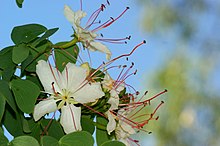Cercideae
| Cercidoideae | |
|---|---|
 |
|
| Phanera variegata | |
 |
|
| Lysiphyllum hookeri | |
| Scientific classification | |
| Kingdom: | Plantae |
| (unranked): | Angiosperms |
| (unranked): | Eudicots |
| (unranked): | Rosids |
| Order: | Fabales |
| Family: | Fabaceae |
| Subfamily: |
Cercidoideae Legume Phylogeny Working Group |
| Type genus | |
|
Cercis L. |
|
| Genera | |
|
See text. |
|
| Synonyms | |
|
|
See text.
Cercidoideae is a subfamily in the pea family, Fabaceae. Well-known members include Cercis (redbuds), including species widely cultivated as ornamental trees in the United States and Europe, Bauhinia, widely cultivated as an ornamental tree in tropical Asia, and Tylosema esculentum (Marama bean), a traditional food crop in Africa. The subfamily occupies a basal position within the Fabaceae and is supported as monophyletic in many molecular phylogenies. At the 6th International Legume Conference, the Legume Phylogeny Working Group proposed elevating the tribe Cercidae to the level of subfamily within the Leguminosae (Fabaceae). The consensus agreed to the change, which was fully implemented in 2017. It has the following clade-based definition:
The most inclusive crown clade containing Cercis canadensis L. and Bauhinia divaricata L. but not Poeppigia procera C.Presl, Duparquetia orchidacea Baill., or Bobgunnia fistuloides (Harms) J.H.Kirkbr. & Wiersema.
Many genera show unique palynology.
Cercidoideae comprises the following genera:
...
Wikipedia
